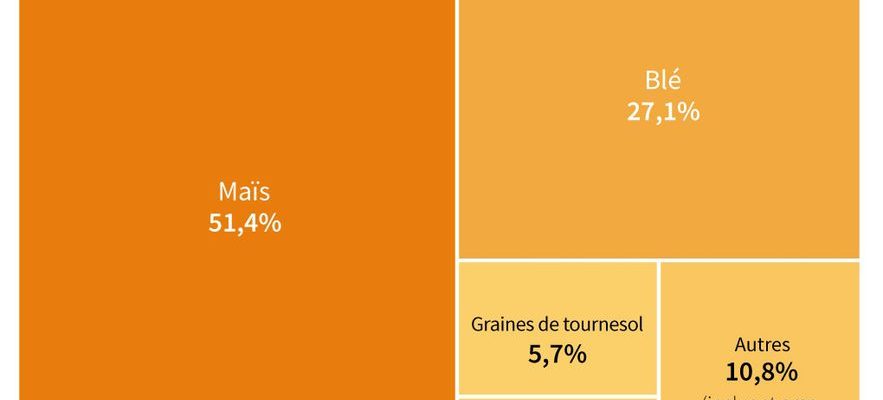“We are not afraid,” assured Ukrainian President Volodymyr Zelensky. Against all odds, kyiv has pledged to continue its grain deliveries, despite the expiration of its agreement with Moscow. The Kremlin refused to renew the text signed under the aegis of the United Nations and Turkey, intended to guarantee the security of exports during the war. Result: since this Monday, July 17 at midnight, the transport of Ukrainian corn and wheat in the Black Sea is no longer safe from Russian attacks.
“Even without Russia, everything must be done so that we can use this corridor in the Black Sea,” urged Volodymyr Zelensky. Since the agreement was put in place in July 2022, Kyiv has exported nearly 33 million tons of grain. But no more ships have left Ukraine since June 27, a sign that the initiative was in jeopardy. To revive it, Russia requires a number of guarantees, including the lifting of obstacles to the export of its own agricultural products, and its reintegration into the Swift interbank settlement system. “As soon as the part concerning Russia gives us satisfaction, we will immediately come back to the agreement on cereals”, assured Dmitri Peskov, spokesman for the Kremlin.
Grains from Ukraine exported by sea
© / afp.com/Sophie STUBER
“Alternatives” to the Black Sea
In parallel with the negotiations, Ukraine is getting organized to continue deliveries. In 2021, it was the third largest exporter of barley, the fourth of corn and the fifth of wheat. A suspension of the deal could hurt international buyers, especially African countries.
But fortunately, “kyiv has developed many alternatives in recent months”, explains to L’Express Arthur Portier, Agritel consultant, a consulting firm specializing in agricultural and agro-industrial markets. Outside the Black Sea, it can use rail, road and river transport. Ships should also continue to leave from the three ports concerned by the agreement, even if “the sea route is no longer secure, so freight costs are likely to increase”, notes Arthur Portier.
The ton of wheat at 230 euros
These B plans should limit the impact of the suspension of the agreement. Provided, of course, that it does not last forever. Its implementation in July 2022 had made it possible to reduce the costs of agricultural products. Wheat had gone from 430 euros per tonne on Euronext in May 2022 to 350 euros the following month, reaching around 230 euros today. “We are no longer in the euphoria of last year,” says Arthur Portier. “For the moment, the market has not moved too much yet”, precisely thanks to the alternatives available to Ukraine. Not to mention that other regions – such as Europe, the second wheat exporter behind Russia – can remedy Ukraine’s shortcomings.
It remains to be seen how long the Kremlin will hold its positions. The refusal to renew the agreement is “inadmissible”, judged Antony Blinken, head of American diplomacy. “Hundreds of millions of people are facing hunger” and “will pay the price”, reacted for his part Antonio Guterres, Secretary General of the UN.
“It’s a psychological war, confirms Arthur Portier. Russia is trying to show international buyers, especially African countries, that it is obliged to suspend the agreement because the West does not want to lift the sanctions.” For the moment, the corridor established in the Black Sea has mainly benefited China, with almost 8,000,000 tonnes of Ukrainian cereals exported, according to United Nations. Spain, Turkey and Italy follow.
